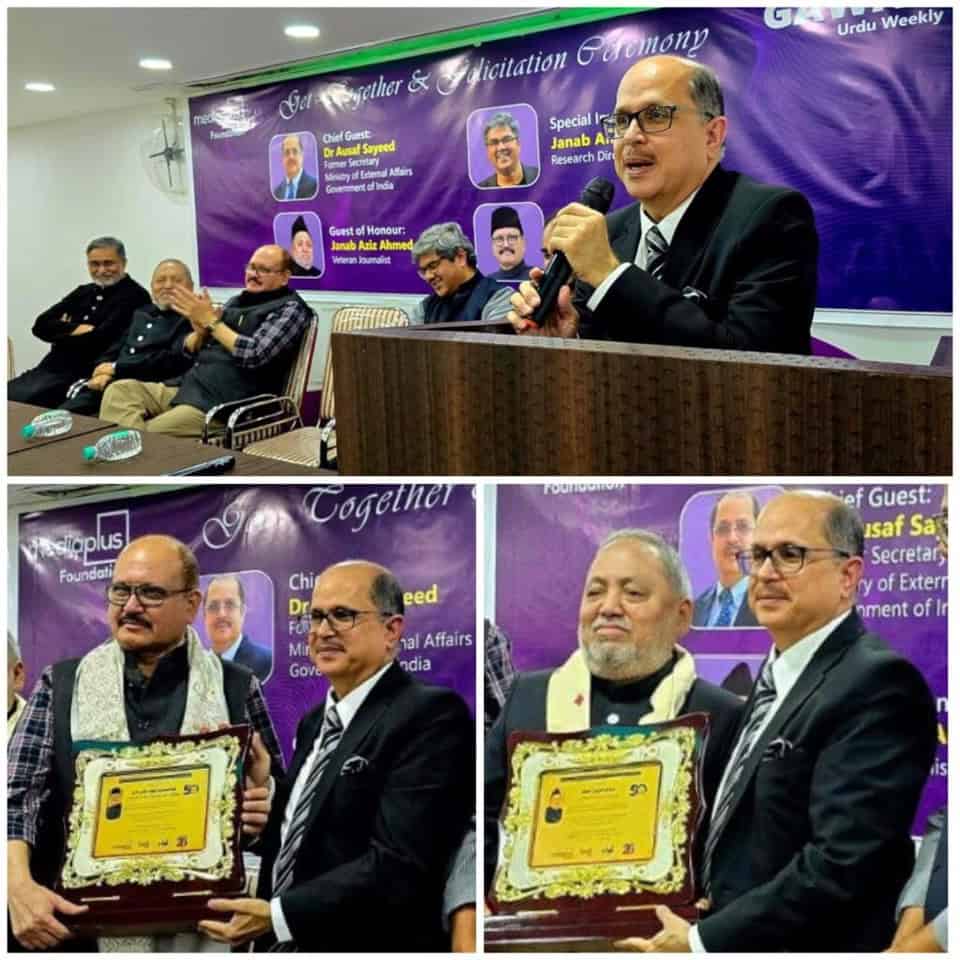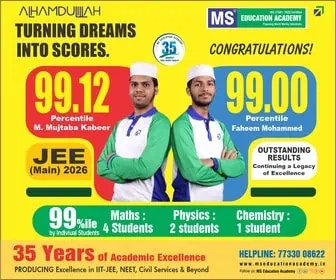
It was an evening steeped in warmth, camaraderie, and a sense of homecoming. Friends met friends, old bonds were renewed, and stories from the newsroom days of yore filled the air. There was poetry, laughter, serious talk, and plenty of emotions as two veteran journalists – Mir Ayoob Ali Khan and Aziz Ahmed – were felicitated for completing 50 years of their remarkable journey in the world of journalism.
The programme, organised by Syed Fazil Husain Parvez, Editor of Gawah at Mediaplus, stood out for more reasons than one. In a world where journalists are seldom honoured by their own peers, here was a rare occasion when the profession paused to celebrate its own. Adding to the charm was the fact that almost everyone in the audience knew one another – a true gathering of friends rather than a stiff, formal function. And to top it off, the proceedings were anchored with flair and confidence by young journo, Syed Khaled Shahbaaz, who kept the evening flowing seamlessly.

Bonhomie and Nostalgia
From the very start, the event was laced with anecdotes and affectionate reminiscences. “Ladakpan se ladkhadane ki umar tak aagaye,” quipped Parvez with characteristic humour, recalling his own early struggles in journalism and the resilience required to survive in a field that seldom promised comfort. The audience chuckled, knowing well the truth hidden in the jest.
There was also surprise in store when two civil servants, Dr. Ausaf Sayeed and Amirullah Khan, were spotted on the dais. What were they doing in a journalists’ felicitation? As it turned out, both had close connections with the veterans being honoured as well as with others in the audience. That only underlined the spirit of the evening: a circle of friends and well-wishers, linked in multiple ways.
Emotions Overflow
Responding to felicitations, Aziz Ahmed found himself overwhelmed with emotion. With a choked voice, he recalled his mentors – Aijaz bhai of Bharat News and Murtuza Mujtahadi – from whom he had first learnt the craft of sahaafat. His professional journey, he reminisced, spanned stalwart publications such as Naveede Deccan, Rahnuma Deccan, Blitz Urdu and Etemaad. “I got all the respect and honour one would wish for in my career,” he said, drawing a heartfelt round of applause.
Ayoob Ali Khan, in turn, looked back on his career that began with the Daily News before leading him to UNI, Arab News, Deccan Chronicle and The Times of India. His 17 years abroad were packed with assignments that tested his mettle – wars, ethnic conflicts, communal riots – across 27 countries. “By becoming a journalist I have not done any favour. It’s a career I chose and tried to remain sincere to my calling,” he said, the sincerity in his voice striking a chord with many in the hall.
He also reflected on the trials of the profession. While journalism is often seen as glamorous profession, it is a road that requires deep commitment. “What I was paid was a pittance, but my commitment sustained me,” he remarked. But today’s times, he lamented, have reduced journalists to being seen as “blackmailers” – a sad commentary on the present state of affairs.
But Ayoob did not stop at nostalgia. He called upon those present to look around the old city of Hyderabad where poverty and illiteracy among Muslims continued to gnaw at society. “There is no point priding over your house and status if you have not paid back to the community,” he urged.
Anecdotes and Reflections
The civil servants too enriched the evening with their reflections. Dr. Ausaf Sayeed, former diplomat, recalled his long association with journalists. Even when a few tried to portray him in poor light, he knew how to handle them with grace. “However, journalists like Ayoob Ali and Aziz Ahmed, who are fair and honest, are becoming extinct”, he remarked.
He revealed plans to publish an encyclopedia highlighting Muslim achievers across diverse fields, along with a documentation of Muslim journalists’ contributions since 1857. He further announced the upcoming launch of two portals – IndianMuslims.com and MuslimWoman.com.
He underlined the importance of economic empowerment and urged seniors like Ayoob Ali and Amirullah Khan to mentor the younger generation. To lighten the mood, Ausaf Sayeed narrated a delightful memory from his student days at Saifabad Science College. His physics lecturer once ticked him off for wasting his parents’ money by chatting in class. At this the entire class burst into giggles because the student whom he was pulling up was the class topper. When this was revealed, the lecturer had sheepishly advised Ausaf Sayeed: “khud to padh lete ho, doosron ko bhi padhne do” (You are studying well, but let others also excel). The story drew laughter and applause.
Amirullah Khan described Ayoob Ali and Aziz Ahmed as “role models for young journalists.” They had walked the path boldly, calling a spade a spade, never bending to pressure. Through their stories they had inspired and guided the community and society at large. He quoted a couplet that summed up their spirit:
Safar mein mushkilen ayen to jurrat aur badhti hai
Koi rasta roke to himmat aur badhti hai
The evening also saw tributes from writers and educationists. Abid Moiz recalled the yeoman work done by Ausaf Sayeed in promoting Urdu in Saudi Arabia. Khaja Nasiruddin lauded the scribes for their steadfastness in troubled times, likening the true journalist to a wave that constantly rises and crashes against the shore, undeterred.
Adding a poetic flavour, Afreen Khundmiri, the Atlanta-based daughter of the renowned poet Talib Khundmiri, recited her father’s famous nazam, Time Capsule:
Mere pyare watan mujhko nayee tareekh likhni hai
Mujhe itna batade main tere barrey main kya likhoon
Tujhe Bharat likhoon, Hindustan ya India likhoon
Kayee to naam hain tere bhala main kaunsa likhoon
A Memorable closing
As the evening drew to a close, there was a palpable sense of nostalgia. Here was a gathering that celebrated not just two veterans but the very spirit of journalism – fearless, committed, and rooted in friendship. The programme ended on a quintessentially Hyderabadi note – with plates of fragrant, sumptuous biryani served to all. The aroma filled the hall, as conversations and laughter continued late into the night.
It was more than a felicitation programme. It was a reunion of sorts, a reaffirmation of values, and above all, a reminder that even in turbulent times, journalism could still command respect when practiced with sincerity and passion. For those present, it was an evening to cherish, long after the last morsel of biryani had been savoured.


